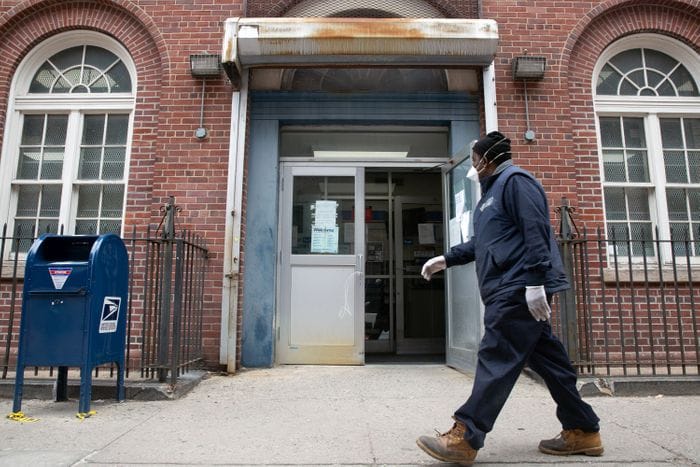Letter Carriers Balk At Entering Brooklyn Post Office Over Coronavirus


By Reuven Blau and Ben Fractenberg, Originally published in THE CITY on March 20, 2020
Letter carriers refused to enter a Brooklyn post office Friday after a supervisor tested positive for coronavirus, according to a union official.
The supervisor of retail operations, who was working at the Metropolitan Station in Williamsburg, was diagnosed Thursday, according to Tom McMenamy, president of American Postal Workers, Local 251, which represents 1,281 clerks and other employees in Brooklyn.
“They disinfected the building last night but people are frightened,” he said Friday. “They fear for their safety.”
On Friday morning, about 20 letter carriers huddled in the back of the historic two-story building. They wouldn’t go inside, and instead waited for mail to be brought to them in the parking lot for delivery, according to McMenamy.
“It sure looks like a job action,” he said.

Mail clerks, meanwhile, were working inside the Debevoise Street post office, dealing with customers.
The unidentified female postal supervisor has been out sick since March 9, the labor leader said.
A spokesperson for the U.S. Postal Service said federal law prohibits the agency from providing information about individual employees.
“However, we are working closely with employees inside our New York facility to assure all public health protocols are followed to ensure the well-being of our employees,” said the spokesperson, Amy Gibbs.
‘Unprecedented Times’
The USPS continues to operate in full force, aside from a temporary suspension of the guarantee on Priority Mail Express International for items headed for China and Hong Kong.
Meanwhile, Amazon, which accounts for approximately 40% of postal service deliveries, says it is looking to hire 100,000 new distribution workers to keep up with increased demand tied to the coronavirus outbreak.
In New York, McMenamy said clerks were trying to avoid close interactions with customers and colleagues.
“We don’t want clerks out in the lobbies with customers exposing them unnecessarily to contact with the virus,” he said. “It’s unprecedented times.”
“We are short supplies like rubber gloves and masks and hand sanitizers like everyone else,” he added.
Still, about 80% of his front-line members showed up for work this week, despite many of them dealing with child care issues due to school closures.
There’s little risk of transferring COVID-19 via the mail, even from China, according to the Centers for Disease Control and Prevention.
Fear and Facts
Dr. Anthony Fauci, director of the National Institute of Allergy and Infectious Diseases, addressed the issue during a recent CNN town hall.
“Even if it is on there, would it be high enough of a concentration to actually be transmitted? Although it is important, I don’t want to downplay the recommendations of wiping down the kinds of things you can easily wipe down,” Fauci said.
“I think if you start thinking about money and mail and things like that, you can almost sort of immobilize yourself, which I don’t think is a good idea,” he added.
Letter carriers who are sick with COVID-19 pose a far greater risk to the public than the mail itself, medical experts say.
Some postal workers throughout the nation say they are being pressured to stay on their routes despite being sick, according to a ProPublica report.
All told, five USPS staffers across the country, including two in White Plains, have tested positive for COVID-19 and none are still on the job, USPS spokesman David Partenheimer told ProPublica.
McMenamy said his entire membership is worried.
“We are in close contact with the public and each other,” he said. “As this thing is developing people are becoming more frightened.”




